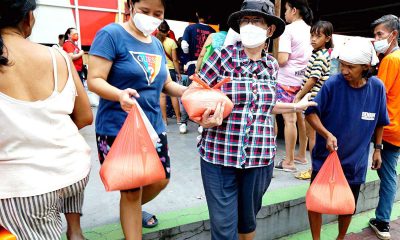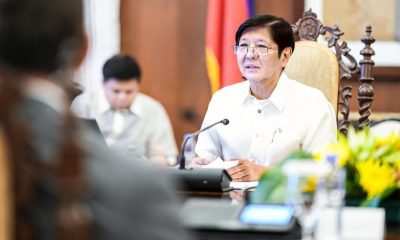Climate change will grab globe’s focus with summit, strikes

On Wednesday, the U.N.’s Intergovernmental Panel on Climate Change will issue a special science report on climate change’s effects on the oceans and the world’s ice and the outlook for seas to rise higher than previously thought. These years-in-the-making massive research reports — which have to be unanimously approved by nations across the globe — grab attention and often increase worries about warming. (File Photo: Bob Blob/Unsplash)
WASHINGTON — Get ready to hear about global warming — or the “climate emergency “ as the United Nations is calling it.
In the next week, there will be climate strikes, climate summits, climate debates, a dire climate science report, climate pledges by countries and businesses, promises of climate financial help and more between now and next Friday. There will even be a bit of climate poetry, film and music.
Much of it is being spurred by the world’s youth.
“We’re about to start an extraordinary series of events over the next few days,” said Rachel Kyte, special representative on sustainable energy for the United Nations secretary-general. “The climate emergency is being declared by people, and especially young people on the streets the world over. And this is about an appropriate response to that emergency.”
The centerpiece is the U.N. climate summit, called by Secretary-General Antonio Guterres. The U.N. chief said he will be pressuring countries to promise to reduce carbon pollution even more than they did in the landmark 2015 Paris climate agreement. These next steps weren’t due until 2020, but Guterres wants them earlier and he wants them to be harsher. Essentially, he’s hoping that by midcentury the world will be adding no more heat-trapping gases to Earth’s atmosphere.
Hundreds of businesses, cities, states and organizations will also be at the meeting to pledge their own pollution cuts and offer financial help to poorer nations trying to shift from fossil fuels to cleaner energy sources. He said the idea is to come out of the summit, not with all problems solved “but with enhanced momentum.”
John Reilly, an MIT economist who has been working on global warming issues for about 40 years, says he’s never seen a busier or more important time.
“This is a new milestone in trying to move ahead on climate change because we have both attention of international organizations and governments and activism by people,” Reilly said.
This burst of events comes as scientists say the world’s climate is getting even wilder, hotter and more dangerous.
“We are seeing more impacts of climate disruption, because we are pushing the climate further and further from its natural state,” said Stanford University environmental sciences chief Chris Field.
After a two-day presidential candidates’ forum Thursday and Friday, the action really gets heated.
Activists on Friday were launching a series of climate strikes, with thousands of youths walking out of class in the United States and around the globe. And they plan to strike again on Sept. 27.
“I don’t want you to listen to me. I want you to listen to the scientists,” Swedish teen activist Greta Thunberg, who drives the climate strike movement, told a United States House committee this week. “I want you to unite behind the science and then I want you to take action.”
That leads to a first United Nations Youth Climate Summit on Saturday, where young activists will make their demands, including no more construction of new fossil fuel power plants, to world leaders.
“The reality is my generation has been committed to a planet that is collapsing,” said U.S. youth climate activist Jamie Margolin of Seattle. “Youth climate activism should not have to exist.”
On Monday, leaders from across the world gather at the climate summit in New York. The U.N. chief wants the world’s carbon pollution to be cut by 45% in the next decade.
“I told leaders not to come with fancy speeches, but with concrete commitments,” Guterres said. “We expect countries to commit to carbon neutrality in 2050.”
Germany’s environment minister Svenja Schulze said her country is aiming for 100% renewable energy, phasing out coal by 2038 at the latest and changing how it is heating houses.
“We must act now if we want to avoid climate catastrophe,” Schulze said. “We are not alone. Every country needs to act.”
The German government will present a plan Friday for how it wants to cut greenhouse gas emissions in Europe’s biggest economy more than half by 2030, compared with 1990 levels.
At the U.N., all eyes will be on President Donald Trump, who is planning to pull the United States out of the Paris agreement. He has yet to commit to speaking at the climate part of the U.N. meeting, while other leaders such as France’s Emmanuel Macron have.
On the same day Trump and other leaders are in New York, climate activists plan to try to block intersections in Washington.
On Wednesday, the U.N.’s Intergovernmental Panel on Climate Change will issue a special science report on climate change’s effects on the oceans and the world’s ice and the outlook for seas to rise higher than previously thought. These years-in-the-making massive research reports — which have to be unanimously approved by nations across the globe — grab attention and often increase worries about warming.
In the next few days, the National Snow and Ice Data Center in the United States will announce that Arctic sea ice either tied for second — or hit second by itself — for the lowest summer ice amount. This is after a record setting melt and heat over Greenland this summer.
Summer this year tied for the hottest in the Northern Hemisphere on record, according to the U.S. National Oceanic and Atmospheric Administration.
Since the first time global leaders met to discuss climate change and other environmental issues in June 1992, the world has warmed by nearly a degree (0.54 degrees Celsius) and carbon dioxide levels in the atmosphere have gone up 15 per cent, according to NOAA data.
Three of the four biggest annual increases in heat-trapping carbon dioxide were in 2016, 2015 and 2018.
“Climate change is no longer just unequivocal, it is now ubiquitous,” University of Michigan environment dean Jonathan Overpeck said. “Record floods and rains, unprecedented heatwaves, countries being devastated by climate supercharged storms, water supplies dwindling due to hotter drought, an Arctic meltdown and coasts being submerged around the globe. All were predicted years ago, and all are now happening.”
Said U.N. chief Guterres on Thursday: “Let’s face it. We have no time to lose. We are losing the race against climate change.”
———
The Associated Press Health and Science Department receives support from the Howard Hughes Medical Institute’s Department of Science Education. The AP is solely responsible for all content.





















